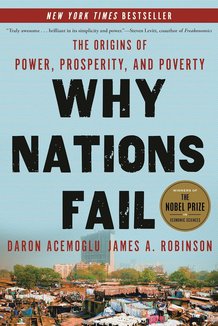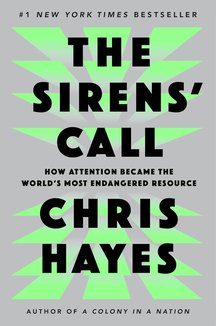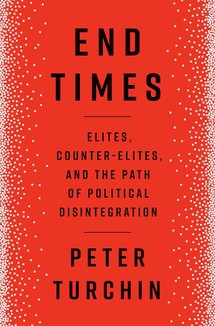Recommended Books

Why Nations Fail: The Origins of Power, Prosperity, and Poverty
Authors:
Daron Acemoglu
,
James A. Robinson
ISBN 13:
978-0307719225
NEW YORK TIMES AND WALL STREET JOURNAL BESTSELLER • From two winners of the 2024 Nobel Prize in Economic Sciences, “who have demonstrated the importance of societal institutions for a country’s prosperity” “A wildly ambitious work that hopscotches through history and around the world to answer the very big question of why some countries get rich and others don’t.”— The New York Times FINALIST: Financial Times and Goldman Sachs Business Book of the Year Award • ONE OF THE BEST BOOKS OF THE YEAR: The Washington Post, Financial Times, The Economist, BusinessWeek, Bloomberg, The Christian Science Monitor, The Plain Dealer Why are some nations rich and others poor, divided by wealth and poverty, health and sickness, food and famine? Is it culture, the weather, or geography that determines prosperity or poverty? As Why Nations Fail shows, none of these factors is either definitive or destiny. Drawing on fifteen years of original research, Daron Acemoglu and James Robinson conclusively show that it is our man-made political and economic institutions that underlie economic success (or the lack of it). Korea, to take just one example, is a remarkably homogenous nation, yet the people of North Korea are among the poorest on earth while their brothers and sisters in South Korea are among the richest. The differences between the Koreas is due to the politics that created those two different institutional trajectories. Acemoglu and Robinson marshal extraordinary historical evidence from the Roman Empire, the Mayan city-states, the Soviet Union, the United States, and Africa to build a new theory of political economy with great relevance for the big questions of today, among them: • Will China’s economy continue to grow at such a high speed and ultimately overwhelm the West? • Are America’s best days behind it? Are we creating a vicious cycle that enriches and empowers a small minority? “This book will change the way people think about the wealth and poverty of nations . . . as ambitious as Jared Diamond’s Guns, Germs, and Steel .”— BusinessWeek

The Sirens' Call: How Attention Became the World's Most Endangered Resource
Author:
Chris Hayes
ISBN 13:
978-0593653111
The #1 New York Times Bestseller • One of Barack Obama's Summer Reading List Picks From the #1 New York Times bestselling author and MSNBC and podcast host, a powerful wide-angle reckoning with how the assault from attention capitalism on our minds and our hearts has reordered our politics and the very fabric of our society “An ambitious analysis of how the trivial amusements offered by online life have degraded not only our selves but also our politics.” — New York Times “Brilliant book . . . Reading it has made me change the way I work and think.” —Rachel Maddow "A useful primer on how social media and the attention economy have warped our democracy and reshaped our lives." —Barack Obama We all feel it—the distraction, the loss of focus, the addictive focus on the wrong things for too long. Something has changed utterly: For most of human history, the boundary between public and private has been clear, at least in theory. Now, as Chris Hayes writes, “With the help of a few tech firms, we basically tore it down in about a decade.” Hayes argues that we are in the midst of a transition whose only parallel is that of labor in the nineteenth century: Attention has become a commodified resource extracted from us, and from which we are increasingly alienated. The Sirens’ Call is the big-picture vision we urgently need to offer clarity and guidance. Sirens are designed to compel us, and now they are going off in our bedrooms and kitchens at all hours of the day and night, doing the bidding of vast empires, the most valuable companies in history, built on harvesting human attention. As Hayes shares, “Now our deepest neurological structures, human evolutionary inheritances, and social impulses are in a habitat designed to prey upon, to cultivate, distort, or destroy that which most fundamentally makes us human.” The Sirens’ Call is the book that snaps everything into a single holistic framework so that we can wrest back control of our lives, our politics, and our future.

End Times: Elites, Counter-Elites, and the Path of Political Disintegration
Author:
Peter Turchin
ISBN 13:
978-0593490501
“Peter Turchin brings science to history. Some like it and some prefer their history plain. But everyone needs to pay attention to the well-informed, convincing and terrifying analysis in this book.” —Angus Deaton, winner of the Nobel Prize in Economics From the pioneering co-founder of cliodynamics, the groundbreaking new interdisciplinary science of history, a big-picture explanation for America's civil strife and its possible endgames Peter Turchin, one of the most interesting social scientists of our age, has infused the study of history with approaches and insights from other fields for more than a quarter century. End Times is the culmination of his work to understand what causes political communities to cohere and what causes them to fall apart, as applied to the current turmoil within the United States. Back in 2010, when Nature magazine asked leading scientists to provide a ten-year forecast, Turchin used his models to predict that America was in a spiral of social disintegration that would lead to a breakdown in the political order circa 2020. The years since have proved his prediction more and more accurate, and End Times reveals why. The lessons of world history are clear, Turchin argues: When the equilibrium between ruling elites and the majority tips too far in favor of elites, political instability is all but inevitable. As income inequality surges and prosperity flows disproportionately into the hands of the elites, the common people suffer, and society-wide efforts to become an elite grow ever more frenzied. He calls this process the wealth pump; it’s a world of the damned and the saved. And since the number of such positions remains relatively fixed, the overproduction of elites inevitably leads to frustrated elite aspirants, who harness popular resentment to turn against the established order. Turchin’s models show that when this state has been reached, societies become locked in a death spiral it's very hard to exit. In America, the wealth pump has been operating full blast for two generations. As cliodynamics shows us, our current cycle of elite overproduction and popular immiseration is far along the path to violent political rupture. That is only one possible end time, and the choice is up to us, but the hour grows late.